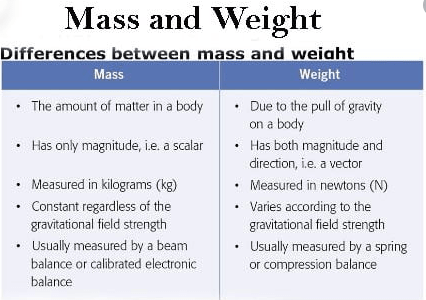Weight and mass

The Differences between Weight and Mass are given here. Are two related but very different concepts and quantities in physics. In everyday speech, we use the term weight to define mass, which is a scalar quantity. Even the Royal Academy recognizes this confusion in its definition of “Regret”
keep reading…
Weight
For classical physics, weight is nothing more than a measure of the gravitational force acting on a given object. Weight is equivalent to the force exerted by a body on a point of support, originated by the action of the gravitational field of the place on the mass of the body.
Being a force, weight is represented by a vector defined by its direction, modulus, and sense. It is applied in the center of gravity of the body and is towards the center of the Earth or the planet or celestial body where we are calculating it.
Its units in the international system are the Newton or N and this is equivalent to:
1 N = 1 kg · 1 m / s²
Mass
Mass is a scalar quantity that expresses the amount of matter that a body has, measured by its inertia, this determines the acceleration produced by a force acting on it.
The unit used to measure mass in the International System of Units is the kilogram (kg).
suggested video: Weight vs Mass
Differences between Weight and Mass
- The mass of a body is an intrinsic property of it. It represents the amount of matter and is independent of the gravitational field and other effects. It represents the resistance of the body to changes in the state of movement.
- The weight of a body is not an intrinsic property of it but depends on the gravitational field in place of the space it occupies.
- Weight is a vector.
- Mass is a scalar unit.